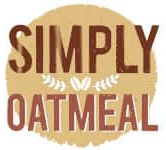In the chaotic rush of mornings, a quick and healthy breakfast often falls by the wayside. But what if there was a delicious and nutritious option that you could prepare the night before and grab-and-go in the morning? Enter overnight oats! This simple dish is not only convenient but also packed with health benefits that will set you up for a successful day. Discover the overnight oats health benefits!
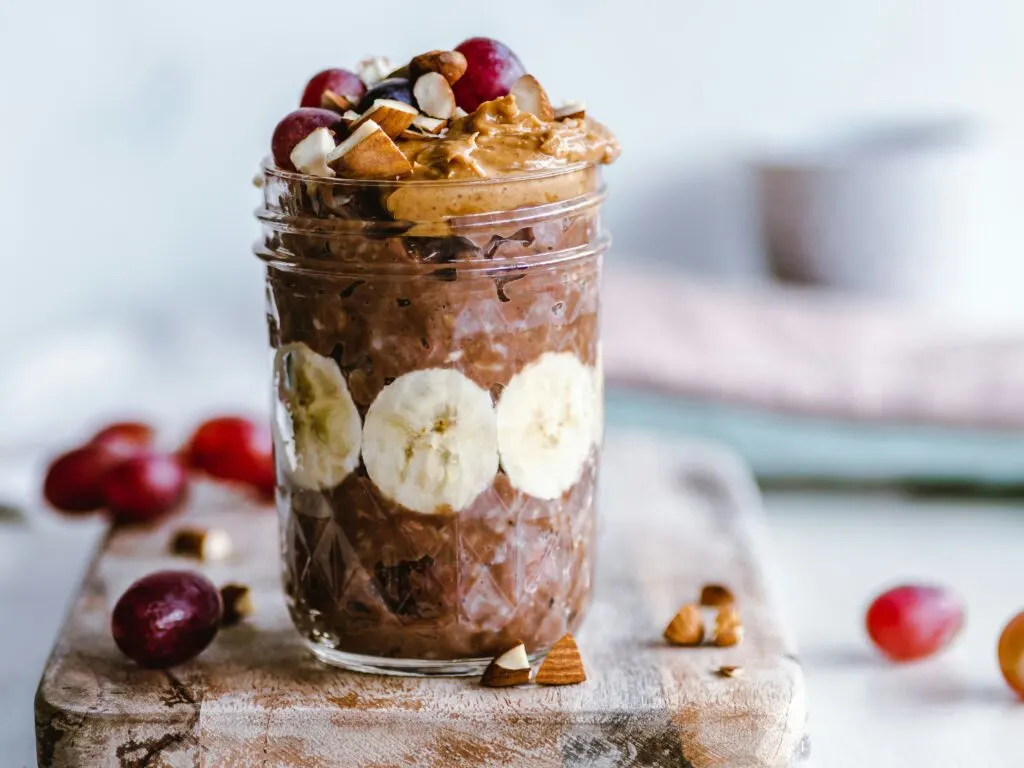
What are Overnight Oats?
Overnight oats are a no-cook method of making oatmeal. Instead of cooking your oats with liquid on the stove or in the microwave, you mix rolled or old-fashioned oats with liquid and other mix-ins, and let it rest in the refrigerator overnight. In the morning, you have a pudding-like porridge that is perfect for easy grab-and-go breakfasts.
The beauty of overnight oats lies in their simplicity and versatility. The basic formula involves combining oats with a liquid, such as milk, yogurt, or a dairy-free alternative. To this base, you can add a variety of ingredients to enhance flavor and nutrition. Popular add-ins include fruits, nuts, seeds, sweeteners, and spices.
Benefits of Overnight Oats Vs. Cooked
In the bustling arena of breakfast choices, two contenders rise above the rest: overnight oats and cooked oats. Both boast impressive nutritional profiles and the ability to fuel your mornings, but which one deserves the gold medal? Buckle up, breakfast enthusiasts, because we’re about to delve into the benefits of each, uncovering the champion that reigns supreme for your health and taste buds.
Learn all about overnight oats’ health benefits and warming up overnight oats!
The Contender in the Cold Corner: Overnight Oats
Overnight oats, the prep-ahead powerhouses, are crafted by soaking rolled oats in liquid (milk, plant-based alternatives, or even yogurt) overnight. This simple act unlocks a treasure trove of health benefits:
Champion of Digestion
Soaking breaks down some of the starch, making them easier to digest and potentially reducing bloating. This can be especially helpful for those with sensitive stomachs.
Fiber Fiesta
Overnight oats are bursting with fiber, keeping you feeling full and satisfied for longer. This curbs cravings and aids in weight management, making them a waistline-friendly choice.
Nutrient Ninja
The cold process preserves more of the oats’ natural vitamins and minerals, like manganese and iron, giving your body a nutritional boost.
Convenience King
The beauty of overnight oats lies in their “set it and forget it” nature. Simply assemble the night before and grab-and-go in the morning, saving you precious time in your hectic routine.
The Hot Favorite: Cooked Oats
Cooked oats, the classic comfort food, have their own set of strengths that shouldn’t be underestimated.
Texture Titan
Cooking oats creates a warm, creamy texture that some find more satisfying than the chilled bite of overnight oats. It’s a matter of personal preference, but cooked oats definitely win on the cozy factor.
Versatility Voyager
Cooked oats are incredibly versatile. You can play with different cooking methods (stovetop, microwave, pressure cooker) and explore endless flavor combinations with spices, fruits, nuts, and even savory toppings.
Budget-Friendly Fighter
Oats are one of the most affordable whole grains, making cooked oats a cost-effective breakfast option that won’t break the bank.
So, Who Wins the Breakfast Brawl?
The truth is, there’s no clear-cut winner. Both overnight oats and cooked oats are excellent breakfast choices with their own unique benefits. The champion ultimately depends on your individual needs and preferences.
Team Overnight Oats: If you prioritize convenience, digestion, and nutrient preservation, overnight oats are your perfect match. They’re the ideal choice for busy mornings and health-conscious individuals.
Team Cooked Oats: If you crave a warm, comforting breakfast with endless flavor possibilities and a budget-friendly price tag, cooked oats are your champion. They’re perfect for those who enjoy spending a little more time in the kitchen and love to experiment with their food.
How To Make Overnight Oats
Overnight oats have become a popular breakfast choice for those seeking a nutritious, easy, and versatile morning meal. Perfect for busy mornings, this no-cook method offers a delicious way to enjoy oats with minimal effort.
Essentially, overnight oats involve soaking rolled oats in a liquid such as milk or yogurt, allowing them to absorb the moisture and soften overnight. This process results in a creamy, pudding-like texture that is both satisfying and digestible.
We’ll walk you through the basic steps of how to make overnight oats, along with tips and variations to keep your breakfast exciting and flavorful.
There are so many health benefits of overnight oats!
Step-by-Step Guide to Making Overnight Oats
Choose Your Oats: Start with rolled or old-fashioned oats for the best texture. Avoid instant oats as they can become too mushy.
Select a Liquid: Milk is the most common choice, but you can use any type of milk, including dairy-free options like almond, soy, or oat milk. For a thicker texture, you can also use yogurt or a combination of milk and yogurt.
Ratio: The general ratio for overnight oats is equal parts of oats and liquid. However, you can adjust this depending on how thick or runny you prefer your oats.
Sweeteners and Flavors: Add your choice of sweeteners like honey, maple syrup, or sugar. You can also add vanilla extract or cinnamon for extra flavor.
Mix-Ins and Toppings: This is where you can get creative. Add fruits, nuts, seeds, or nut butter to your mixture. Some popular choices include bananas, berries, chia seeds, and almond butter.
Combine and Soak: Mix all the ingredients in a jar or a bowl. Make sure the oats are fully submerged in the liquid. Cover and refrigerate overnight or for at least 6 hours.
Serve: In the morning, give your oats a good stir. If they’re too thick, you can add a little more liquid to reach your desired consistency. Enjoy cold, or warm them up if you prefer.
Tips and Variations
Protein Boost: For a protein-rich breakfast, add a scoop of your favorite protein powder or Greek yogurt.
Vegan Options: Use plant-based milk and sweeteners like agave or maple syrup to make your overnight oats vegan.
Seasonal Fruits: Incorporate seasonal fruits for freshness and variety throughout the year.
On-the-Go: Prepare your oats in a mason jar for an easy, portable breakfast option.
Make-Ahead: You can make a batch of overnight oats for the whole week. They typically stay fresh for up to five days in the refrigerator.
How long can oatmeal last?
Oatmeal, the humble whole grain, is a breakfast champion. It’s packed with fiber, protein, and complex carbohydrates, leaving you feeling full and energized. But beyond its nutritional prowess, oatmeal also shines for its versatility and, perhaps surprisingly, its longevity.
That’s right, oatmeal can hang around in your pantry for quite a while without losing its magic. But just how long depends on several factors, like the type of oats, preparation, and storage practices. So, ditch the breakfast-spoilage anxiety and dive into the world of oat longevity with this handy guide!
Uncooked Oat Champs: The Long-Lasting Crew
Uncooked oats are the ultimate pantry heroes, lasting for months and even years if stored properly. Here’s a breakdown of their shelf life:
Rolled oats and steel-cut oats: These sturdy guys can conquer your pantry for 1-2 years when kept in a cool, dry place and sealed in an airtight container. Think of them as the Gandalf of grains, always wise and ready for adventure (a.k.a., breakfast).
Oat bran: This fiber superstar enjoys a similar reign of 1-2 years under the same cool, dry, and airtight conditions.
Instant oats: While not as durable as their rolled and steel-cut brethren, instant oats can still hold their own for up to a year in a cool, dry pantry with a tight seal.
Flavored Oats: The Party Favors with Shorter Shelf Lives
Flavored oats add a burst of excitement to your breakfast routine, but their added ingredients like dried fruit and nuts shorten their shelf life. Aim to enjoy them within 6-9 months if stored properly.
Cooked Oats: A Temporary Treat
Once you’ve cooked those beautiful oats, their shelf life takes a significant dip. Treat them like leftovers and store them in the fridge for a maximum of 3-5 days. If you’re planning a breakfast feast in the future, cooked oats can be frozen for up to 3 months.
Spoilage Signs: When to Say Goodbye
Even with proper storage, oats can eventually go bad. Keep an eye out for these signs:
Unpleasant odor: Trust your nose. If your oats smell musty or off, it’s time to say goodbye.
Color change: Oats naturally have a light beige color. If they’ve become discolored or darkened, it’s a sign of spoilage.
Mold growth: This one’s a no-brainer. If you see any mold, toss those oats immediately.
Remember: When in doubt, throw it out! Food safety is always the top priority.
Are Oats Gluten Free?
For those with gluten sensitivities or celiac disease, understanding which foods are safe to eat is crucial. Oats are a common subject of confusion in this regard. The question “Are oats gluten-free?” is a prevalent one, especially as oats are often considered a healthy breakfast option and a versatile ingredient in many recipes.
The answer isn’t as straightforward as a simple yes or no. We will explore the relationship between oats and gluten, and provide insights to help those needing or choosing to follow a gluten-free diet make informed decisions about including oats in their meals.
The Gluten Status of Oats
Naturally Gluten-Free: Oats, in their pure form, are naturally gluten-free. Gluten is a type of protein found in wheat, barley, and rye, but not in oats.
Cross-Contamination Issues: The primary concern with oats in the context of gluten is cross-contamination. This can occur in several ways:
Growing Fields: Oats are often grown in fields adjacent to wheat, barley, or rye, which can lead to cross-contamination through the soil or harvesting equipment.
Processing Facilities: Many facilities that process oats also process wheat and other gluten-containing grains. This shared environment increases the risk of gluten contamination.
Transportation and Storage: Cross-contamination can also occur during transportation and storage if oats are handled in the same facilities as gluten-containing grains.
Certified Gluten-Free Oats: To address these concerns, there are certified gluten-free oats available on the market. These oats are grown, processed, and packaged in dedicated gluten-free facilities to prevent any cross-contamination.
Label Reading is Crucial: If you’re avoiding gluten, it’s essential to read labels carefully. Look for oats that are explicitly labeled as gluten-free. This labeling indicates that the oats have been tested and confirmed to have a gluten content below the standard threshold (usually less than 20 parts per million).
Sensitivity Variations: It’s important to note that some individuals with celiac disease or gluten sensitivity may still react to gluten-free oats. This reaction is not due to gluten but to avenin, a protein in oats that can trigger a similar response in some people.
Consulting Healthcare Providers: If you have celiac disease or a gluten sensitivity, it’s advisable to consult with a healthcare provider or a dietitian before adding oats to your diet, even if they are labeled gluten-free.
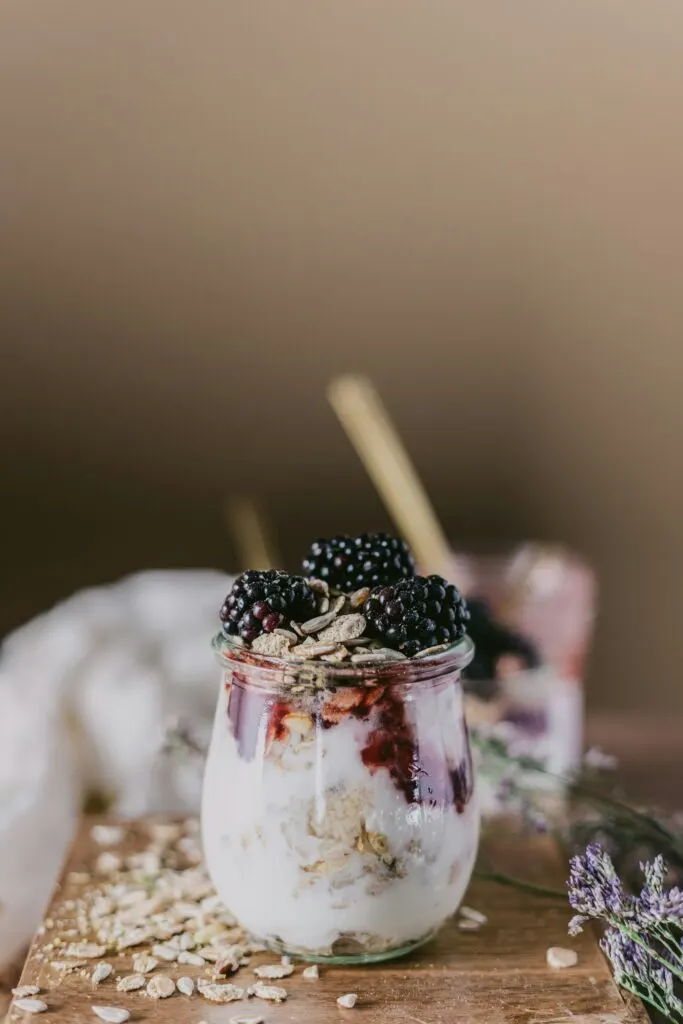
What Happens When You Eat Oats Everyday
Oats have long been revered as a staple in the health-conscious diet, known for their nutritional richness and versatility. But what happens when you incorporate oats into your daily diet? Eating oats every day can have a profound impact on your overall health, from improving heart health to aiding in weight management.
This humble grain, often consumed as a classic breakfast dish, can be a powerhouse of benefits when included regularly in your meals. We will delve into the various positive effects that come from consuming oats daily and how they contribute to a healthier lifestyle.
Learn more about an easy option, Oats Overnight!
Positive Impacts of Eating Oats Everyday
Improved Heart Health
Oats are rich in a type of soluble fiber known as beta-glucan, which has been shown to reduce cholesterol levels, particularly LDL (bad) cholesterol. Regular consumption can lead to a lower risk of heart disease.
Enhanced Digestive Health
The high fiber content in oats not only helps in lowering cholesterol but also aids in digestion. Eating oats daily can help regulate bowel movements and prevent constipation.
Stabilized Blood Sugar Levels
For those with diabetes or at risk of developing diabetes, oats can be beneficial. The beta-glucan in oats forms a gel-like substance in the gut, which slows down the digestion and absorption of carbohydrates, resulting in more stable blood sugar levels.
Weight Management
Oats can play a crucial role in weight management due to their high fiber content. They provide a feeling of fullness and satiety, which can reduce overall calorie intake and aid in weight loss or maintenance.
Rich Source of Nutrients
Oats are a nutritional powerhouse, providing essential vitamins and minerals such as B vitamins, iron, and magnesium. They are also a good source of antioxidants, which can help combat oxidative stress in the body.
Skin Health
The antioxidants and anti-inflammatory properties of oats can also benefit skin health. Oats are often used in skincare products for their soothing properties, especially for conditions like eczema and irritation.
Enhanced Immune Response
The beta-glucan in oats may also help boost your immune system, making it more efficient in fighting infection and inflammation.
Versatility in Diet
Oats are incredibly versatile and can be incorporated into various recipes beyond the traditional oatmeal, such as in smoothies, pancakes, and baked goods, ensuring a diverse and enjoyable diet.
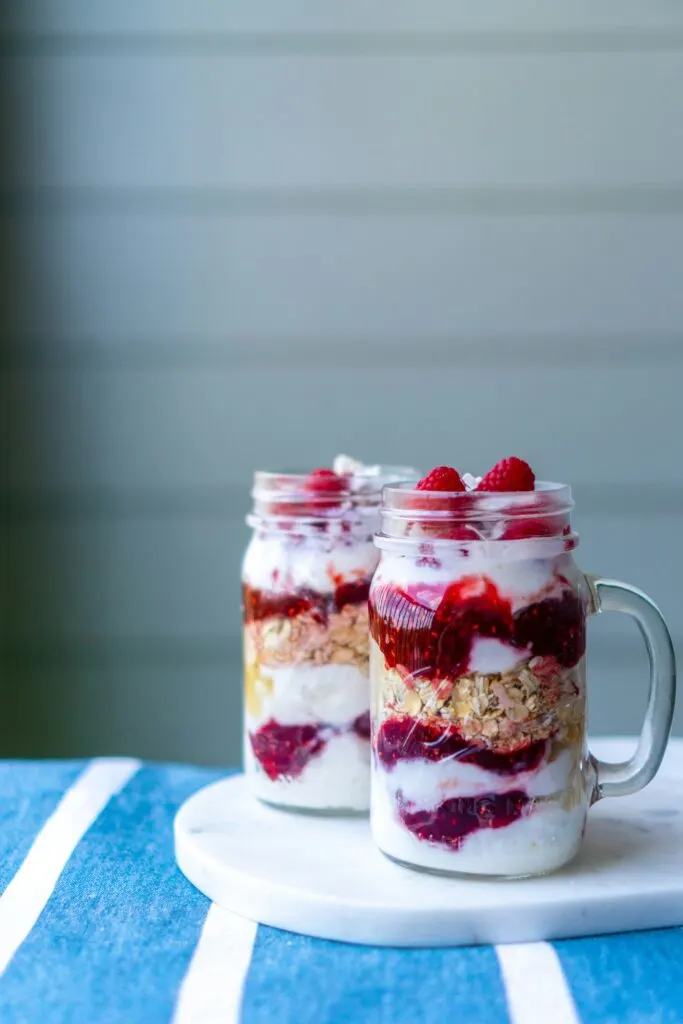
Most Common Mistakes
Oats are a staple in many kitchens, favored for their versatility, health benefits, and ease of preparation. However, despite their simplicity, there are common mistakes that many of us unknowingly make while preparing or consuming oats.
These errors can range from cooking techniques to nutritional missteps, impacting both the taste and health benefits of this beloved grain. We’ll explore the most common oats mistakes, providing insights into how to avoid them and get the most out of your oatmeal experience.
Overcooking Oats
Overcooking oats is a frequent mistake that can lead to a mushy, unappetizing texture. It’s important to remember that oats, especially quick and rolled oats, don’t need excessive cooking time. They’re best when cooked until just tender.
Using the Wrong Oat Variety
Different oat varieties suit different purposes. For instance, steel-cut oats are great for a chewy, nutty breakfast porridge, while rolled oats are better for baking. Using the wrong type can result in a disappointing texture or flavor.
Not Rinsing Steel-Cut Oats
Rinsing steel-cut oats before cooking can remove excess starch and improve the texture of the cooked oats. This step is often overlooked but can make a significant difference.
Adding Too Much Sugar
While it’s tempting to sweeten oatmeal, especially for kids, adding too much sugar can turn this healthy meal into a less healthy option. Instead, try natural sweeteners like fruits, honey, or maple syrup.
Not Soaking Oats
Soaking oats, especially tougher varieties like steel-cut oats, can shorten cooking time and make them easier to digest. Overnight oats are a perfect example of how soaking improves both texture and digestibility.
Ignoring Savory Options
Oats are often associated with sweet flavors, but they’re incredibly versatile and can be used in savory dishes too. Savory oatmeal with ingredients like cheese, herbs, and even a poached egg can be a delicious and nutritious meal.
Forgetting to Add Flavor
Plain oats can be bland. Enhancing oatmeal with spices, fruits, nuts, or seeds can significantly improve its taste and nutritional value.
Skimping on the Liquid
The liquid-to-oat ratio is crucial for achieving the perfect consistency. Too little liquid can result in dry, undercooked oats, while too much can make them too soupy.
Cooking Oats in a Pot That’s Too Small
Oats expand as they cook, so it’s essential to use a pot that’s large enough to accommodate this expansion and prevent boiling over.
Not Considering Gluten Contamination
For those who are gluten-sensitive or have celiac disease, it’s important to choose oats that are certified gluten-free, as oats can be contaminated with gluten during processing.
Helpful Oat Hacks
Oats are a breakfast favorite worldwide, known for their health benefits and versatility. However, even with a staple as simple as oats, there’s always room for creativity and efficiency in the kitchen.
Whether you’re an oatmeal enthusiast or just looking to streamline your morning routine, knowing a few oat hacks can make a significant difference. From enhancing flavor to saving time, these helpful oat hacks are designed to optimize your oatmeal preparation and enjoyment.
Hack #1: Spice Up Your Life
Ditch the plain porridge! A sprinkle of cinnamon, nutmeg, or ginger can add warmth and depth of flavor. Feeling adventurous? Try cardamom, chai spices, or even a pinch of chili powder for a savory kick.
Hack #2: Sweeten the Deal (Naturally)
Skip the processed sugars and embrace the natural sweetness of fresh or frozen fruits. Berries, bananas, and apples are classic choices, but don’t be afraid to experiment with mango, pineapple, or even figs. A drizzle of honey or maple syrup can add a touch of indulgence without going overboard.
Hack #3: Get Nutty
Nuts and seeds are not just for toppings. Blend them into your oatmeal for added protein, healthy fats, and a delightful crunch. Almonds, walnuts, pecans, chia seeds, and hemp seeds are all great options. Bonus points for a homemade nut butter swirl!
Hack #4: Think Outside the Bowl
Oats aren’t just for breakfast! Whip up a batch of overnight oats for a grab-and-go option, bake savory oat bran muffins for a satisfying snack, or even use oat flour in your next batch of cookies. The possibilities are endless!
Hack #5: Make it a Meal
Don’t relegate oats to the sweet side. Savory oatmeal bowls are a thing of beauty! Try adding spinach, tomatoes, and feta cheese for a Mediterranean twist, or go Mexican with black beans, corn, and avocado. A fried egg on top takes it to the next level.
Hack #6: Batch Cook Like a Boss
Save time and prevent morning chaos by cooking a big batch of oats on the weekend. Portion them out into individual containers and store them in the fridge for quick and easy breakfasts throughout the week. Just add your favorite toppings and heat them up!
Hack #7: Befriend Your Blender
For the ultimate creamy texture, blend your cooked oats with a little milk or yogurt. This is also a great way to sneak in extra greens like spinach or kale. You can even add frozen fruit for a smoothie-like bowl.
Hack #8: Don’t Skip the Soak
Soaking your oats for at least 10 minutes before cooking can make them easier to digest and reduce the risk of blood sugar spikes. It also gives them a chewier texture, if that’s your preference.
Hack #9: Embrace the Leftovers
Leftover oatmeal doesn’t have to be boring! Turn it into pancakes, waffles, or even oatmeal cookies. You can also add it to smoothies, yogurt parfaits, or even meatloaf for extra fiber and texture.
Hack #10: Have Fun!
Oats are your culinary playground! Don’t be afraid to experiment with different flavors, textures, and combinations. The more you play, the more amazing oat creations you’ll discover.
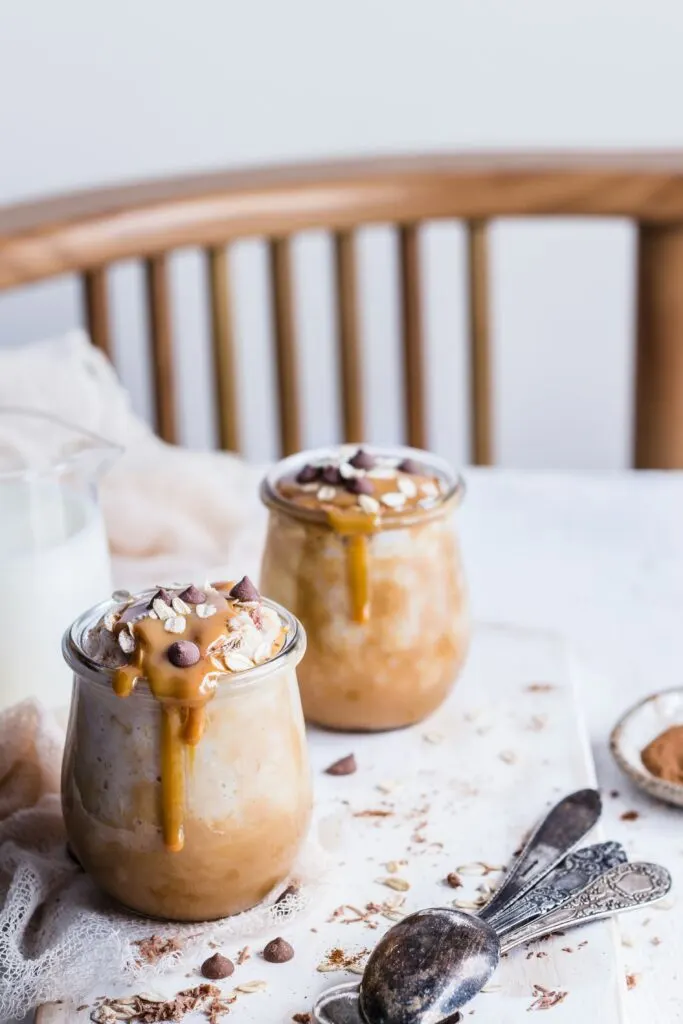
Frequently Asked Questions (FAQs)
Yes, overnight oats are generally healthy. They offer a good source of fiber, protein, and essential nutrients, and can be part of a balanced diet.
Eating oats every night can be healthy as part of a balanced diet. Oats are rich in fiber, vitamins, and minerals. However, variety in your diet is also important for nutritional balance.
Overnight oats improve gut health by providing soluble fiber, aiding digestion, and supporting good bacteria growth in the digestive system.
Yes, you can eat overnight oats throughout the day. They are a convenient and healthy option that can be enjoyed as a meal or snack anytime.
You May Also Like
- What are Porridge Oats?
- Porridge Oats Vs Rolled Oats
- Savory Oatmeal
- Instant Pot Oatmeal
- Apple Cinnamon Oatmeal
If you enjoy this post about overnight oats and their health benefits, please leave a rating and review!
